牛津译林英语七年级英语下册知识点归纳
Unit 2 知识点梳理-牛津译林版七年级英语下册

牛津译林版七下Unit 2 知识点梳理1.Where are you going?你要去哪儿?现在进行时表将来。
现在进行时可用于表示计划或安排将要发生的动作,go,come,leave等表示位移的动词,都可以用现在进行时表示将来。
2.I’m going to visit our new neighbours. 我打算去拜访我们的新邻居。
neighbour “附近的人或物”(侧重指人)neighbourhood “邻近街区,居民区”(侧重指地方)3.I’m afraid they won’t welcome visitors like you. 恐怕他们不会欢迎像你这样的客人。
I’m afraid + (that) 从句. “恐怕……”,常有“抱歉”之意。
I’m afraid not.(恐怕不是)I’m afraid so.(恐怕如此)be afraid to do sth.“害怕/不敢去做某事”be afraid of sb./sth.“害怕某人/某物”be afraid of doing sth. “害怕/担心做某事”be afraid for “为……担心”visitor:n. “访问者,参观者”动词加-er或-or变成名词,表示从事该职业的人。
like:prep. “像……一样,相似”。
反义:unlikelook like “看起来像”;be like “像”辨析:like/aslike:强调“如同……一样,如……一般”。
用于相似关系,即两者在形态上或者性质上有相似之处,但并不等同。
as:表示“以……的身份;作为”。
用于说明同一关系,即两者实为一体。
作动词,“喜欢”。
like doing sth.“喜欢做某事”。
4.How many buildings are there in your neighbourhood? 在你的居民区里有多少幢楼?how相关短语:how much:“多少”,提问物品价格或不可数名词。
牛津译林版七年级下英语知识点总结

牛津译林版七年级下英语知识点总结1."Would you like to do something?"Positive answer: "Yes。
I'd/we'd like/love to."Negative answer: "I'd/we'd like/love to。
but。
" or "Sorry。
I'm/We're afraid not."2."Next to" means near or beside.3."One" refers to any one of the same type of thing ned earlier。
"It" refers to the same thing ned earlier.4."Be from" means to come from.5."The capital of" refers to the capital or provincial capital ofa place.6."Around the world," "in the world," and "all over the world" all mean globally.7."Enjoy oneself," "have a good time," and "have fun doing something" all mean to have a good experience doing something.8."In the centre of" means in the middle of.9."Share something with someone" means to use or enjoy something together.10."Look out" means to look outside。
Unit3知识点整理牛津译林版七年级英语下册

7B Unit3 Wele to Sunshine Town 知识点整理1.等一会儿wait/just a minute2.足以做某事be enough for sth. be enough to do sth.3.点一个披萨order a pizza4.来自英国的一群交换留学生 a group of exchange students from the UK5.观看一些精彩的电影watch some wonderful films6.我们学校的足球场our school’s football field7.邀请他们和我们一起吃饭invite them to have dinner with us8.尝一些中国食物try some Chinese food9.关于阳光镇的视频 a video about Sunshine Town10.为某事做准备prepare for sth =get ready for sth.11.坐地铁by underground (介词短语)take the/an underground (动词短语)12.在镇中心in the town center = in the center of the town13.因为...著名be famous for 作为...著名be famous as14.全面了解中国历史learn all about China’s history15.期待/盼望(做)某事look forward to (doing) sth16.观看京剧watch Beijing opera17.到处都是all over the place18.在故宫博物馆的一天 a day at the Palace Museum19.金銮宝殿the golden throne20.艺术品works of art21.中国画Chinese paintings22.更多many more+可数名词复数much more+不可数名词/比较级23.为出行制定计划make plans for a visit24.在湖面上划船row a boat on the lake25.在农场on a farm26.互相了解know each other27.享受某人的生活enjoy one’s life28.hear/see.watch/feel/notice sb. do sth. 经常性,反复性;整个过程hear/see.watch/feel/notice sb. doing sth. 正在进行29.我的一个老朋友要来看我。
译林版牛津英语七年级下册知识点归纳(全册)
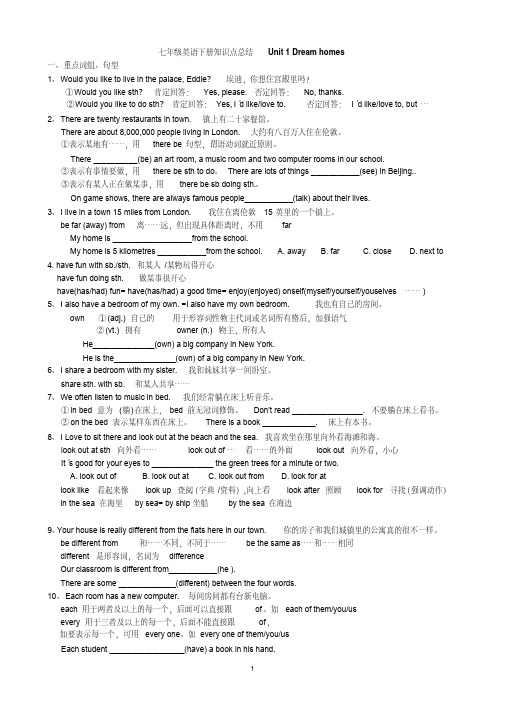
invite (v.) 邀请
invitation (n) 邀请 an invitation letter 一封邀请函
invite sb to someplace 邀请某人去某地或参加活动
invite sb to do sth 邀请某人去做某事
18、 have an area of over 260,000 square miles 占地 260,000 多平方英里 91,000 square meters in size 91,000 平方米的面积
hope +(that) 从句,上句等于 I hope I can visit your home some day. 常用 I hope you have a good time.
some day
将来有一天,总有一天
只用来指将来
one day
某一天
可以指过去,也可以指将来
the other day
There __________(be) an art room, a music room and two computer rooms in our school. ②表示有事情要做,用 there be sth to do。 There are lots of things ___________(see) in Beijing.. ③表示有某人正在做某事,用 there be sb doing sth.。
② Would you like to do sth? 肯定回答: Yes, I ’d like/love to.
否定回答: I ’d like/love to, but …
2、 There are twenty restaurants in town. 镇上有二十家餐馆。 There are about 8,000,000 people living in London. 大约有八百万人住在伦敦。 ①表示某地有……,用 there be 句型,谓语动词就近原则。
牛津译林版英语七年级下册units5-8期末复习重点知识点总结和试卷
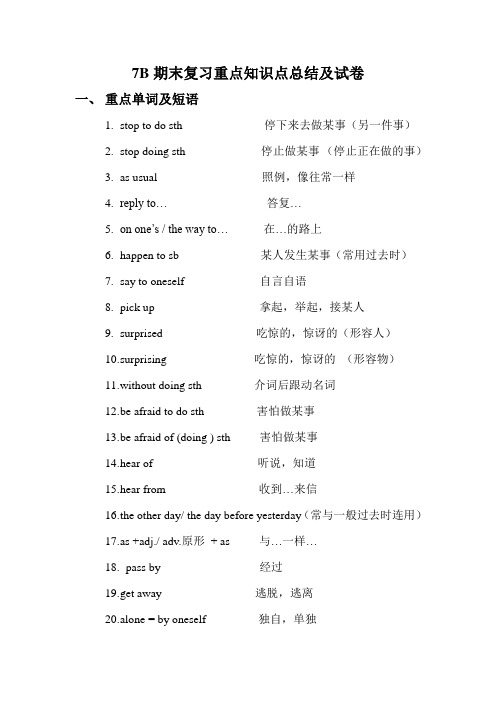
7B期末复习重点知识点总结及试卷一、重点单词及短语1.stop to do sth 停下来去做某事(另一件事)2.stop doing sth 停止做某事(停止正在做的事)3.as usual 照例,像往常一样4.reply to…答复…5.on one’s / the way to…在…的路上6.happen to sb 某人发生某事(常用过去时)7.say to oneself 自言自语8.pick up 拿起,举起,接某人9.surprised 吃惊的,惊讶的(形容人)10.s urprising 吃惊的,惊讶的(形容物)11.w ithout doing sth 介词后跟动名词12.b e afraid to do sth 害怕做某事13.b e afraid of (doing ) sth 害怕做某事14.h ear of 听说,知道15.h ear from 收到…来信16.t he other day/ the day before yesterday(常与一般过去时连用)17.a s +adj./ adv.原形+ as 与…一样…18.pass by 经过19.g et away 逃脱,逃离20.a lone = by oneself 独自,单独21.t hrough 穿过,通过(空间)go through 通过…22.p ut up 搭,竖立23.c entury ----centuries 世纪,百年24.e xcited/exciting 分别形容人和物25.e nough 足够的(放于名词前,形容词后)be enough to do sth26.t oo… to太…而不能…27.d ecide to do sth 决定做某事28.r each sth 伸手(脚)够到29.f ail to do sth 做某事失败30.s end sb sth= send sth to sb 发送…给…31.b e able to do sth= can/could 能/会做某事32.p ay for…为…付款33.r aise sth for sb 为…筹集/募集…34.r aise sth to do sth 募集…做某事35.s ave…from…从…救出…36.b e badly hurt 伤的很重37.p rotect…from doing sth保护…免于….38.p ut it out 把它扑灭(代词放中间)39.i n hospital 住院40.i n the hospital 在医院41.n od—nodded (过去式)点头42.n ews (不可数) 新闻,消息43.b y the way 顺便说说44.n o problem 没问题45.d o/try one’s best to do sth尽某人最大努力做某事46.c areful---careless(反义词)47.d o well in doing=be good at doing sth 擅长做某事48.a t the age of…在…岁的时候49.r ecommend sb for…推荐某人获得…50.t ake part in 参加(节目,游戏,活动)51.l ose one’s way = get lost迷路52.t each sb (代词用宾格)sth 教…(代词用宾格)53.t each sb to do sth 教某人做某事54.b ark at sb 对某人叫/吠55.l ook after…well=take good care of…照顾好…56.h ave trouble doing sth 做某事很困那/麻烦57.a ll the time 一直,总是58.a gree with sb 同意某人的观点agree to do sth 同意做某事59.w eigh up to…重达…60.g row up 成长,长大61.t alk= speech 演讲(可数)62.n oisy---noisily adv. 嘈杂的/地(变y为i加ly)期末复习试卷一、单项选择1. She is 11-year-old girl and enjoys playing chess.A. an; anB. a; theC. an; /D. the; /2. Everybody is too tired. Let's a rest.A. stop havingB. to stop havingC. stop to haveD. stop to have3. He was to hear of the news this morning.A. surprising; surprisedB. surprised; surprisingC. surprised; surprisedD. surprising; surprising4.She met her old friend the other day.A. on her way to homeB. on her way homeC. in my way homeD. in my way to home5.The big fire in Australia was at last.A. put inB. put outC. put upD. put down6.Lots of students couldn’t hear the teacher on Ding ding(钉钉)A. enough clearlyB. clearly enoughC. enough clearD. clear enough7.The sunshine went the window, so the whole room was bright.A. acrossB. overC. throughD. past8.--- I can’t reach the book on the shelf, can you help me?--- .A. Never mindB. No problemC. That's all rightD. That's OK9.He did n’t ___________ his pen-friend and he missed her very much.A. heard fromB. hear ofC. heard ofD. hear from10.Many people have _ to do because of the disease Corona vi(新型冠状病毒).A. everythingB. somethingC. anythingD. nothing11.Doctor Zhong nanshan says it still _______ long time to cure(治愈) the diseaseA. spendB. costC. payD. take12.The Eiffel Tower, a ____________ tower, is 130 years old this year.A. 324 metres tallB. 324-metres-tallC. 324-metre-tallD. 324-metre tall13.She felt very sad because she ___________ in the middle-term exam.A. reachedB. failedC. hitD. entered14.The small giraffe is too short the leaves on the tree.A. to reachingB. to reachC. reachingD. not to reach15. good news! The doctors found the medicine to cure the disease!A. HowB. What aC. WhatD. How a二、完形填空阅读下面短文,掌握其大意,从每题所给的A. B. C. D四个选项中,选出最佳选项。
牛津译林版七年级下英语知识点总结

7BUnit1 Dream homes1、Would you like to do sth...?肯定回答:Yes, I’d/We’d like/love to否定回答:I’d/We’d like/love to,but...或Sorry,I’m/We’re afraid not...2、next to =near 紧邻,在......近旁3、one 泛指上文提及的同类事物中的一个。
It 特指上文提到的同一个事物4、be from = come from 来自5、the capital of ......的首都/省会6、around the world = in the world = all over the world 在全世界7、enjoy oneself = have a good time = have fun doing sth 做某事很开心8、in the centre of 在......的中心9、share sth with sb = share sb sth 与某人合用/分享某物10、look out向外看look out at sth 向外看某物look out of 向......外看11、have a lot of things to do I have a lot of homework to do.12、foot 复数形式为feet13、have an area of 占......面积14、over = more than 超过15、There be +,名词+ v-ing+地点状语There is a baby sleeping in the room.16、be full of = be filled with 满是......,充满......17、of one’s own 属于某人自己的on one’s own 单独地;独立18、hope to do sth hope sb will/can do sth没有hope sb to do sth19、some day 将来的某一天,总有一天20、常用的电话用语:Who's speaking,please?请问你是哪位? Is that ... ( speaking)?你是......吗?This is ... ( speaking).我是...... May I speak to..?.我能和....通电话吗?21、take a message 传个话22、ask sb. (not) to do sth. 要求某人(不要)做某事23、call sb back 给某人回电话24、double adj 双的,两倍的25、one of +名词复数26、at the foot of 在......脚下27、in front of 在...外部的前面in the front of 在...内部的前面28、on the ground floor 在一楼29、more than 多于less than 少于30、invite sb(not)to do sth邀请某人(不要)做某事invite sb to some place邀请某人去某地31、each of us = we each 我们每个人32、in town在城里33、a cup of tea一杯茶34、living room客厅dining room餐厅35、washing machine洗衣机36、a football field 一个足球场37、have parties 举行聚会38、more than enough足够多,太多39、in bed躺在床上in the bed在床上40、square metre平方米41、the best place to chat and watch TV 聊天和看电视最好的地方42、home cinema家庭影院43、(be)different from 与...不同反: (be ) the same as... 与......相同44、a swimming pool 游泳池45、at the weekend = on weekends在周末46、listen to sth.听某事物47、like sth best最喜欢某物48、live in.. 住在....49、after dinner晚饭后50、watch TV看电视51、chat with sb.和某人聊天52、in size在尺寸上53、telephone number电话号码54、love to do sth. love doing sth. 喜爱做某事55、I like to do sth. like doing sth. 喜欢做某事56、would like to do sth.愿意做某事would like sb. to do sth.想要某人做某事57、Thanks for doing sth.=Thank you for doing sth. 感谢你做某事。
牛津译林英语七年级下册全册知识点汇总
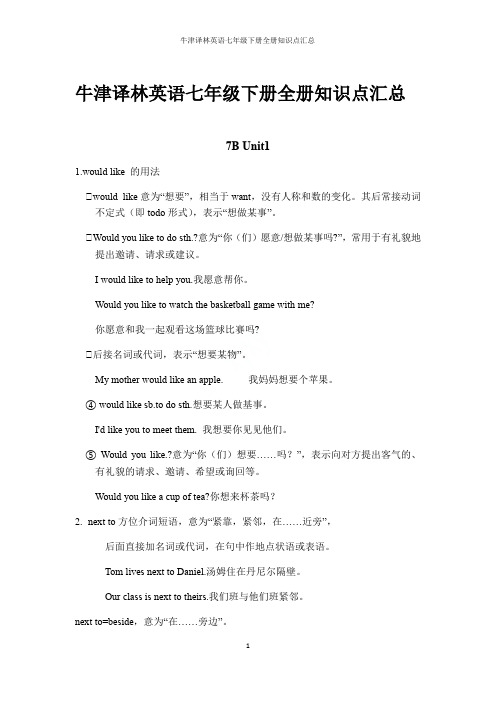
牛津译林英语七年级下册全册知识点汇总7B Unit11.would like 的用法①would like意为“想要”,相当于want,没有人称和数的变化。
其后常接动词不定式(即todo形式),表示“想做某事”。
①Would you like to do sth.?意为“你(们)愿意/想做某事吗?”,常用于有礼貌地提出邀请、请求或建议。
I would like to help you.我愿意帮你。
Would you like to watch the basketball game with me?你愿意和我一起观看这场篮球比赛吗?①后接名词或代词,表示“想要某物”。
My mother would like an apple. 我妈妈想要个苹果。
④ would like sb.to do sth.想要某人做基事。
I'd like you to meet them. 我想要你见见他们。
⑤Would you like.?意为“你(们)想要……吗?”,表示向对方提出客气的、有礼貌的请求、邀请、希望或询回等。
Would you like a cup of tea?你想来杯茶吗?2.next to方位介词短语,意为“紧靠,紧邻,在……近旁”,后面直接加名词或代词,在句中作地点状语或表语。
Tom lives next to Daniel.汤姆住在丹尼尔隔壁。
Our class is next to theirs.我们班与他们班紧邻。
next to=beside,意为“在……旁边”。
My home is next to our school.=My home is beside our school.我家靠近我们的学校。
3.in town 在城里,在镇上in the town 在这座城里,the 表示特指4.Your watch is very beautiful.I want to buy one,too. 你的手表很漂亮,我也想买一块。
译林版牛津英语七年级下册全册Unites1-8单元知识点及语法归纳

译林版牛津英语七年级下册全册Unites1-8单元知识
点及语法归纳
以下是译林版牛津英语七年级下册全册Unites1-8单元的知识点及语法归纳。
Unit 1 Knowing about yourself 知识点:
1. 询问和介绍自己的姓名、年龄、国籍以及所在地等。
2. 描述自己的外貌特征、爱好和能力。
3. 学习使用形容词、副词、名词、动词等词汇来构造自己的句子。
4. 学会听、说、读、写26个字母。
语法归纳:
1. 人称代词:I, you, he, she, it, we, they.
2. 动词be的各种形式(am, is, are)。
3. 形容词的比较级和最高级形式。
4. 副词和形容词的用法。
5. 一般现在时的肯定句、否定句及一般疑问句。
Unit 2 Disaster zone 知识点:
1. 描述自然灾害的发生和后果。
2. 学习句式\。
牛津译林版初中英语七年级下册知识点归纳
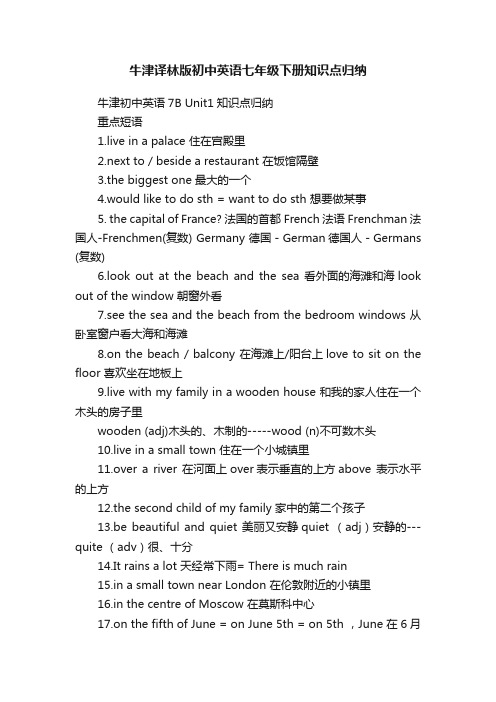
牛津译林版初中英语七年级下册知识点归纳牛津初中英语7B Unit1知识点归纳重点短语1.live in a palace 住在宫殿里2.next to / beside a restaurant 在饭馆隔壁3.the biggest one 最大的一个4.would like to do sth = want to do sth 想要做某事5. the capital of France? 法国的首都French 法语Frenchman 法国人-Frenchmen(复数) Germany 德国-German德国人-Germans (复数)6.look out at the beach and the sea 看外面的海滩和海look out of the window 朝窗外看7.see the sea and the beach from the bedroom windows 从卧室窗户看大海和海滩8.on the beach / balcony 在海滩上/阳台上love to sit on the floor 喜欢坐在地板上9.live with my family in a wooden house 和我的家人住在一个木头的房子里wooden (adj)木头的、木制的-----wood (n)不可数木头10.live in a small town 住在一个小城镇里11.over a river 在河面上over表示垂直的上方above 表示水平的上方12.the second child of my family 家中的第二个孩子13.be beautiful and quiet 美丽又安静quiet (adj)安静的---quite (adv)很、十分14.It rains a lot 天经常下雨= There is much rain15.in a small town near London 在伦敦附近的小镇里16.in the centre of Moscow 在莫斯科中心17.on the fifth of June = on June 5th = on 5th ,June 在6月5日18.in a flat 在公寓里on a busy street 在繁忙的街道上19.share sth with sb 与某人分享/合用某物20.be busy with sth = be busy doing sth 忙于(做)某事21.be friendly / nice / kind to sb 对某人友好22.sleep in the garden 睡在花园里23.the best place to grow flowers 种花的最好地方24.cook meals = make dinner = do some cooking 做/ 烧饭25.in most homes 在大多数家庭tell sb about sth 告诉某人有关某事26.on the ninth floor 在第9层( On which floor does he live? )27.chat with friends on the balcony 和朋友在阳台上聊天28.on a quiet street 在一条安静的街道上29.sit between you and me 坐在我和你之间on / over the phone = by phone 通过电话30.two hundred students 200名学生hundreds of students 数百名学生Two hundred of the students are from America 学生中有200名来自美国31.arrive on Sunday 在星期天到达( arrive at / on; reach; get to)32.can't wait to do sth 迫不及待的做某事(can't help doing 情不自禁做某事)33.have a free day 休息/休假一天( have three days off 放三天假)34.be tired after the long plane journey from London to Beijing (tired不要误写成tried)从伦敦到北京的长途飞机旅行后劳累了35.Don't worry 别担心worry about sb/sth 为……而担心be worried about... (形容词)36.sound great /good 听起来很棒(sound, feel, look, taste等为连系动词,后接形容词)/doc/1d290992.html,e first = win the first prize (in an English exam)得第一名38.make a video of 拍……的录像watch the video 看录像39.be different from …… 与……不同be the same as …… 与……相同There are many differences between the USA and the UK (difference 可数名词区别)=The USA is different from the UK (different adj 不同的)40.your own bedroom 你自己的卧室owner (n)主人own (adj)自己的41.call sb (up)打电话给某人call sb back 给某人回电话answer the telephone接电话42.homes in different countries 不同国家的家be free = have time 有空43. take a message for sb 为某人捎个可信44.at least 至少at most 至多at last 最后,终于at the same time 同时45.fifty metres long 50米长an 800-metre-long river46.have a room with twelve showers and four baths 有一间有12个淋浴器和4个浴缸的房间47.have / take a shower 淋浴have/take a bath 洗澡48.on the bedside table 在床头柜上coffee table 矮茶几49.live two floors above / below sb 住在某人上面/下面两层50.the Great Wall 长城the Summer Palace 颐和园51.the Space Museum 太空博物馆the Palace Museum 故宫重点句子1.Would you like to live in a palace ? 你想住在宫殿里吗?2.The capital of France is Paris 法国的首都是巴黎3.My favourite place is the balcony 我最喜欢的地方是阳台4.We love to sit on the floor and look out at the beach and sea我们喜欢坐在地板上看外面的海滩和大海5.My house is over a river 我家房子在河上There is a bridge over the river 河上有座桥6.I climb a ladder to get into my house 我爬梯子进入我的房间=I get into my house with a ladder = I use a ladder to get into my house7.I am the second child of my family 我是家中第二个孩子8.My family and I often sit in the kitchen while my mother makes dinner当妈妈做饭时,我和家人坐在厨房里9.I have a dog .Its birthday is on the fifth of June 我有一只狗它的生日在6月5日10.I live with my family in a flat on a busy street 我和家人一起住在一条繁忙街道的一间公寓里=My family and I live in a flat on a busy street11.I share a bedroom with my sister 我和姐姐共享一个卧室=My sister and I share a bedroom = My sister and I live in the same bedroom12.Our neighbours are friendly /kind / nice to us 我们的邻居对我们很友好13.The garden is the best place to grow flowers 花园是种花的最好地方14.In most homes , people cook meals in the kitchen 在大部分家庭,人们在厨房烧饭15.The window is opposite the door 窗户在门的对过16.I am arriving in Shanghai on Sunday 我将在周六到达上海=I will arrive in Shanghai on Sunday = I will get to Shanghai on Sunday=I will reach Shanghai on Sundayarrive in + 大地点arrive at + 小地点当后接地点副词here,there ,home时要省略介词get home 到家(也要省略介词to) 当后无到达地点时,只用arrive 而不用reach或get When will they arrive tomorrow ? 他们明天什么时候到达?17.I can't wait to visit the Space Museum 我迫不及待参观太空博物馆18.I think you would be tired after the long plane journey from London to Beijing我认为你从伦敦到北京的长途飞机旅行后应该劳累了19.I 'd like to take you to the Great Wall on Tuesday , the nineteenth of February我想在2月19日星期二,带你去长城20.Your house is really different from the flats in Beijing 你的房子真的不同于北京公寓21.I would like my own bedroom 我想有一间我自己的卧室22.I 'll call you when I am free 当我有空时,我将打电话给你23.What kind of home do you live in ? 你住在什么样的家里?24.There are no other rooms on the second floor 三楼没有其他的房间了other 和some,any,many,no等限定词连用时,常放在它们的后面Ask some other students 问问别的同学们吧25.Many friends can stay with me at the same time 许多朋友可以和我同时呆在一起26.I have a room with (= which has )twelve showers and four baths我有一间有12个淋浴器和4个浴缸的房间27.May I speak to Daniel,please ? 我可以和Daniel通话吗?This is Daniel (speaking),.Who's calling,please? 我就是,你是谁?This is Simon 我是Simon28.It's + adj + (for sb) + to do sth 做某事对某人来说是……的It's nice to sit in it and watch TV 坐在里面看电视是很好的29.It's my first time to come to Beijing 这是我第一次来北京序数词前一般要用定冠词,但是当序数词前有my,his her等形容词性物主代词或this,that 等指示代词,则不用再加the.牛津初中英语7BUnit2知识点归纳重点短语及句子1.one tin /can dog food 一听狗食How many tins of dog food can we buy with one yuan ?None我们用一元钱可以买多少听狗食?一个没有2.go to the supermarket 去超市3.how much money do we have ? 我们有多少钱4.对how many / how much……?回答时用none对what 's ……?回答时用nothing对who 's ……?回答时用nobody /no one5.order a pizza 点一个比萨饼6.maybe (adv)或许、大概=perhaps 要放于句首Maybe you are rightmay be 也许作复合谓语要放于句中=You may be right Maybe we can order a pizza = We may order a pizza7.a group of exchange students 一群交流学生8.love watching /seeing films 喜欢看电影9.take sb to s.p 带某人去某地10.sports centre 体育中心11.lots of different Chinese restaurants 许多不同的中餐店12.go to the cinema =see /watch a film 去电影院/看电影13.prepare for 为……做准备14.a great new town 一座崭新的城15.There are lots of things to do in Sunshine Town 在阳光城有许多事情要做16.tell sb about sth 告诉某人有关……We want to tell you about life in this great new town 我们想告诉你有关这座城市的生活17.live in a modern town 住在现代化的城里18.by underground 乘地铁It’s only 40 minutes from the centre of Beijing by undergro und从北京市中心乘地铁只需40分钟19.less……than…… 比……更少less air pollution 更少的空气污染mo re……than…… 比……更多fewer ... than 比……更少(修饰可数名词复数)There is les air pollution in Sunshine Town than in other areas 阳光城的空气污染比北京的其他地区的污染少20.go walking = go for a walk 去散步21.a country park 一个乡村公园22.most of us /them / you 我们/他们你们/中的大多数most of the students 大多数学生23.be close to 靠近、离……很近stand close to me 站靠近我my close friend 亲密的朋友24.none of us 我们中一个也不( neither of us 我们两个都不,后用三单)25.for example 例如26.live in the same building 住在相同的大楼27.don’t have to do = needn't do 不必做某事You do not have to go far 你不必走太远28.need help with…… 在……方面需要帮助far away from 离……遥远need sth 需要…… need to do sth 需要做某事How far 多远They do not have to go far if they need help with theirhomework如果他们在家庭作业方面需要帮助,他们不必走太远29.You can shop until ten o'clock at night in most shopping malls在大多数购物中心你可以到晚上10点( until 直到)I won't go to bed until he comes back 直到他回来我才会睡觉(not …until 直到……才)。
牛津译林版七年级下册英语Unit1-Unit8各单元语法知识点复习提纲详细版(全面,实用!)
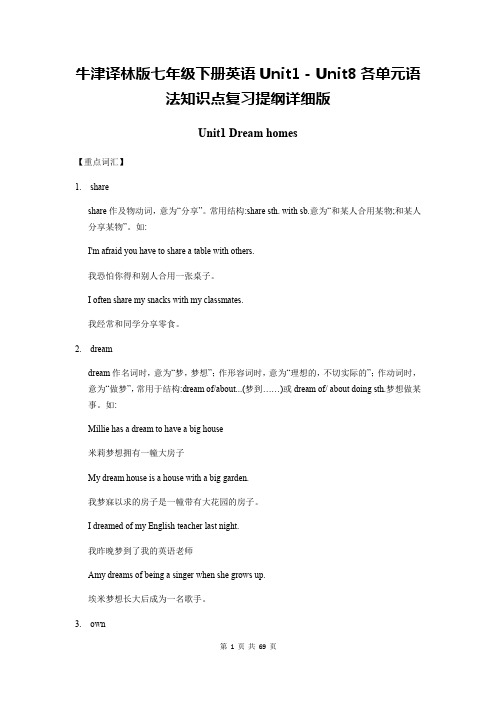
牛津译林版七年级下册英语Unit1-Unit8各单元语法知识点复习提纲详细版Unit1 Dream homes【重点词汇】1. shareshare作及物动词,意为“分享”。
常用结构:share sth. with sb.意为“和某人合用某物;和某人分享某物”。
如:I'm afraid you have to share a table with others.我恐怕你得和别人合用一张桌子。
I often share my snacks with my classmates.我经常和同学分享零食。
2. dreamdream作名词时,意为“梦,梦想”;作形容词时,意为“理想的,不切实际的”;作动词时,意为“做梦”,常用于结构:dream of/about...(梦到……)或dream of/ about doing sth.梦想做某事。
如:Millie has a dream to have a big house米莉梦想拥有一幢大房子My dream house is a house with a big garden.我梦寐以求的房子是一幢带有大花园的房子。
I dreamed of my English teacher last night.我昨晚梦到了我的英语老师Amy dreams of being a singer when she grows up.埃米梦想长大后成为一名歌手。
3. ownown作形容词.意为“自己的,属于自己的”,常和形容词性物主代词连用,构成短语of one's own,表示“属于某人自己的”,on one's own = alone,意为“独自地”。
own作动词时,表示“拥有”。
如:I have my own computer我有属于我自己的电脑。
That's a car of her own.那是她自己的汽车。
He lives on his own.他一个人生活。
牛津译林版七年级下英语知识点总结

7BUnit1 Dream homes1、Would you like to do sth...?肯定回答:Yes, I’d/We’d like/love to否定回答:I’d/We’d like/love to,but...或Sorry,I’m/We’re afraid not...2、next to =near 紧邻,在......近旁3、one 泛指上文提及的同类事物中的一个。
It 特指上文提到的同一个事物4、be from = come from 来自5、the capital of ......的首都/省会6、around the world = in the world = all over the world 在全世界7、enjoy oneself = have a good time = have fun doing sth 做某事很开心8、in the centre of 在......的中心9、share sth with sb = share sb sth 与某人合用/分享某物10、look out向外看look out at sth 向外看某物look out of 向......外看11、have a lot of things to do I have a lot of homework to do.12、foot 复数形式为feet13、have an area of 占......面积14、over = more than 超过15、There be +,名词+ v-ing+地点状语There is a baby sleeping in the room.16、be full of = be filled with 满是......,充满......17、of one’s own 属于某人自己的on one’s own 单独地;独立18、hope to do sth hope sb will/can do sth没有hope sb to do sth19、some day 将来的某一天,总有一天20、常用的电话用语:Who's speaking,please?请问你是哪位? Is that ... ( speaking)?你是......吗?This is ... ( speaking).我是...... May I speak to..?.我能和....通电话吗?21、take a message 传个话22、ask sb. (not) to do sth. 要求某人(不要)做某事23、call sb back 给某人回电话24、double adj 双的,两倍的25、one of +名词复数26、at the foot of 在......脚下27、in front of 在...外部的前面in the front of 在...内部的前面28、on the ground floor 在一楼29、more than 多于less than 少于30、invite sb(not)to do sth邀请某人(不要)做某事invite sb to some place邀请某人去某地31、each of us = we each 我们每个人32、in town在城里33、a cup of tea一杯茶34、living room客厅dining room餐厅35、washing machine洗衣机36、a football field 一个足球场37、have parties 举行聚会38、more than enough足够多,太多39、in bed躺在床上in the bed在床上40、square metre平方米41、the best place to chat and watch TV 聊天和看电视最好的地方42、home cinema家庭影院43、(be)different from 与...不同反: (be ) the same as... 与......相同44、a swimming pool 游泳池45、at the weekend = on weekends在周末46、listen to sth.听某事物47、like sth best最喜欢某物48、live in.. 住在....49、after dinner晚饭后50、watch TV看电视51、chat with sb.和某人聊天52、in size在尺寸上53、telephone number电话号码54、love to do sth. love doing sth. 喜爱做某事55、I like to do sth. like doing sth. 喜欢做某事56、would like to do sth.愿意做某事would like sb. to do sth.想要某人做某事57、Thanks for doing sth.=Thank you for doing sth. 感谢你做某事。
牛津译林版七年级英语下册全册重点知识点汇总
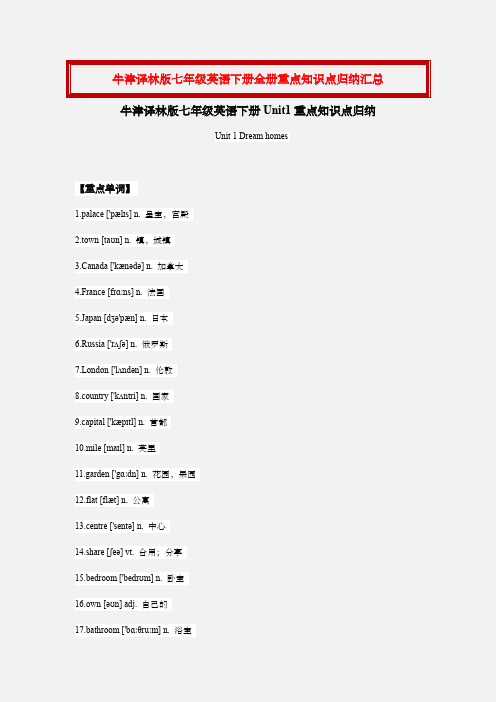
牛津译林版七年级英语下册全册重点知识点归纳汇总牛津译林版七年级英语下册Unit1重点知识点归纳Unit 1 Dream homes【重点单词】1.palace ['pælɪs] n. 皇室,宫殿2.town [taʊn] n. 镇,城镇3.Canada ['kænədə] n. 加拿大4.France [frɑːns] n. 法国5.Japan [dʒə'pæn] n. 日本6.Russia ['rʌʃə] n. 俄罗斯7.London ['lʌndən] n. 伦敦8.country ['kʌntri] n. 国家9.capital ['kæpɪtl] n. 首都e [maɪl] n. 英里11.garden ['gɑːdn] n. 花园,果园12.flat [flæt] n. 公寓13.centre ['sentə] n. 中心14.share [ʃeə] vt. 合用;分享15.bedroom ['bedrʊm] n. 卧室16.own [əʊn] adj. 自己的17.bathroom ['bɑːθruːm] n. 浴室18.balcony ['bælkəni] n. 阳台19.beach [biːtʃ] n. 海滩20.sea [siː] n. 海21.zero ['zɪərəʊ] num. 零22.hundred ['hʌndrəd] num. 百23.thousand ['θaʊzənd] num. 千lion ['mɪljən] num. 百万25.foot [fʊt] n. (pl. feet) 英尺26.square [skweə] adj. 平方的27.metre ['miːtə] n. 米,公尺28.area ['eərɪə] n. 面积29.over ['əʊvə] prep. 超过30.fork [fɔːk] n. 餐叉31.fridge [frɪdʒ] n. 冰箱32.knife [naɪf] n. (pl. knives)刀mp [læmp] n. 灯;台灯34.shower ['ʃaʊə] n. 淋浴35.sofa ['səʊfə] n. 沙发36.video ['vɪdɪəʊ] n. 录像37.may [meɪ] modal v. 可以;也许,可能38.message ['mesɪdʒ] n. 消息,音信39.double ['dʌbl] adj. 双的;两倍的40.study ['stʌdi] n. 书房41.machine [mə'ʃiːn] n. 机器42.field [fiːld] n. 田,地43.invite [ɪn'vaɪt] vt. 邀请44.stay [steɪ] vi. 停留,逗留【重点短语】1.be full of 充满2.of one’s own 某人自己的3.some day 某天4.take a message 传口信5.call sb. back 给某人回电话6.football field 足球场7.at the foot of 在……脚下8.washing machine 洗衣机9.dream homes 梦想家园10.live next to the restaurant 住在饭店隔壁11.the capital of Japan 日本的首都12.in the town/the city/the country 在镇上/市里/农村13.three students from different countries 来自不同国家的三个学生14.a flat in the center of Moscow 莫斯科中心的一套公寓15.have fun with my dog 和我的狗玩得高兴16.have fun (in) doing sth. 做某事很愉快17.share a bedroom with sb. 与某人共享一个卧室18.have my own room 有我自己的房间19.look out at the beach 眺望海滩20.cook meals 煮饭21.have an area of… 有……的面积22.make a video 制作一个视频23.send sb. sth. 把某物寄送给某人24.invite sb. to do sth. 邀请某人去做某事25.more than enough food 绰绰有余的食物【重点句型】1.Would you like to live in a palace?你愿意住在一个宫殿里吗?2.The capital of Japan is Tokyo.日本的首都是东京。
+Unit+6+重点语法内容梳理 牛津译林版七年级英语下册

常州市7B U6 重点语法内容梳理牛津译林版1.Which outdoor activity do you like best, football, riding or camping?Which+名词单数区别which of +名词复数outdoor 形容词室外的/反义词室内的indoor词组一个室外的游泳池an outdoor swimming pool2.hurry to work after a quick breakfast 早饭过后匆忙去工作动词hurry ----三单hurries/过去时hurried动词用法hurry to do sth 匆忙做某事同义词短语do sth in a hurry 要注意的是这里的hurry是名词3.ride bikes to keep fit骑车来保持健康动词ride ----三单rides 过去时rode同义词短语ride bikes =go to sp by bike =go to sp on a bike4.that difficult那么困难这一单元that中文是那样的,那么的形容词那么简单that easyIt isn't really that heavily.雨没有下的很大。
5.Is skating more interesting than some other indoor activities?溜冰比其他户外活动更有趣吗?动词skate----动名词skating/去溜冰go skating滑雪ski 动词/去滑雪go skiing6.动词辨析wonder想知道=want to knowask 问、要求surprised令人吃惊的complain动词抱怨、投诉He complained that the boss didn't think much of those who were hard-working.他抱怨老板没有考虑到那些勤奋工作的人动词用法complain/complain to somebody about something向某人抱怨某事complain that+从句7.go swimming去游泳/go skating去溜冰/go camping去野营/go riding去骑自行车运动8.Hurry up ,or we will miss the train.赶快,否则我们要错过这班火车了.Don't hurry.不要着急By the way.顺便说一下9.too many+可数名词复数/too much+不可数名词much too….太….+形容词或副词---There are too many people traveling during the May Day holiday.---Yes ,the traffic is much too busy.五一假期有许多人旅行,是的,交通是太忙了.10.---What do you like about the trip?----The fresh air and green trees.关于这次旅行,你喜欢什么?新鲜的空气和绿水.How do you like the trip?你觉得这次旅行怎么样?同义句what do you think of….注意句意11.句子翻译他对爬山感兴趣吗?Is he interested in climbing hills?词组对做某事感兴趣be interested in doing something爬山climb hills / climb mountains注意单词拼写放学后,这个女孩匆忙去电影院了.The girl hurried to the cinema after school.同义句转换The girl went to the cinema in a hurry after school.他总是向他的同学抱怨作业太多. He always complains to his students about too much homework.动词complain/complain to somebody about something向某人抱怨某事骑车对你的健康有好处.Cycling is good for your health.动词cycle 骑自行车运动/去骑自行车go cycling这里是动名词作主语,谓语是单数.be good for something对..有好处health 名词健康请你把这箱西红柿搬到厨房好吗?Would you please carry these boxes of tomatoes to the kitchen?句型请你做什么事情好吗?Would you please do something?把某物搬到某地carry something to someplacecarry无方向/bring带来/take带走注意三者的区别12.Now I go to school by underground because the underground passes my school.现在我可以坐地铁去学校了,因为地铁经过我的学校.动词pass/介词past---经过我的学校pass my school=go past my school13.The watches here look very cool but cost too much.这儿的手表看起来很酷,但是要花费很多钱.注意名词要体现单复数,这里是复数形式.14. He didn't do his homework well because he didn't notice his mistakes.他没有很好的做作业因为没有注意到他的错误.动词注意notice/注意某事notice something名词通知布告动词注意的用法注意某人经常做某事notice somebody do something注意某人正在做某事notice somebody doing something跟它一样用法的动词hear/ see/ watch15.I was surprised to see many tigers in the zoo.我很惊讶的在动物园里看到了如此多的老虎.be surprised to do something很惊讶的做某事16.She cried when she found herself alone at home.当她发现独自一个人在家的时候她哭了.反身代词与主语保持一致find oneself alone发现某人独自一人alone独自一个人lonely形容词孤独的偏僻的17.My father's keys were all lost ,he couldn't go into his office.我爸爸的钥匙都丢了,他不能进办公室了.注意名词体现单复数,钥匙复数keys18. Eddie hit his head on the ground so we took him to hospital Eddie.hit on the ground在地上磕到了头动词前后时态保持一致hit动词击打hit ---hit19.The famous star stood up and left the room quickly ,no one knew what happened. 这个明星站起来,很快离开了房间,没有人知道发生了什么事情.前后动词时态保持一致stand---stood /leave---leftleave someplace离开某地leave for someplace动身出发去某地注意两者词组的区别20.It's a busy day today I can't I can't get away from my office from 7 P.M.真是繁忙的一天,在下午七点之前,我不能离开我的办公室.get away离开/get up起床/get through经历通过/get into进入21.The moonlight is shining through the window月光透过窗户闪闪发光.through介词通过穿过从内部穿过22.I looked up and found many white cloud in the sky.我在天空当中向上看,发现了许多白云.动词短语look up向上看look down向下看/look down on somebody看不起某人23.Who took the apples out of the box?谁把苹果从盒子里拿出来了?take something out of something把某物从某地拿出来24.动词用法Jam fell off a tree yesterday and hurt his leg badly .Jim昨天从树上摔下来并且伤到了他的腿.and连接前后动词时态保持一致fall---fell /hurt hurtMy father took a little toy out of his pocket and give it tome.我的爸爸把小玩具从他的口袋拿出来,并且给了我.过去式take ---took /give ---gaveI was very happy because I passed my driving test.我非常开心,因为我通过了我的驾照考试.过去式pass --pastI didn't notice them enter the room because I was in the kitchen then.我没有注意到他们进入房间,因为我那时在厨房.动词notice的用法notice somebody do something注意某人做某事的全过程This young man was surprised to find a black dog in this garden.这个年轻人很惊讶的在花园里发现了一只黑狗.be surprised to do something动词用法25.句子翻译他跳下了那个大洞,把男孩从危险中救出.He jumped down the big hole and saved the boy out of danger.他站了起来,跟着兔子跑过田野.He stood up and run across the field after the rabbit.他听到这个消息后,匆忙去了医院.He hurried to the hospital and after he heard of the news.他不想再迟到了,所以今天早上起床很早.He didn't want to be late again so he got up very early in the morning.26.The doors are all locked.门都是锁着的locked形容词锁着的表示一种状态be lockedlock名词锁/一把锁a lock/ 动词上锁锁门lock the door注意词性的区别27.Did you see the mice’s holes just now?你刚刚看到老鼠的洞了吗?名词单复数,前后一致mice老鼠复数,hole也是复数holes28.There are many shops on both sides of the street.在街的两边有许多商店.both sides路两边名词复数on each side of the street在马路的每一边注意单复数的区别29.I talk to my friend in a low voice so that others couldn't hear us.我和我的朋友小声说话,以至于别人听不到.in a low voice低的声音/in a high voice高的声音30.A car hit the boy and he was a badly hurt.一辆车撞到了这个男孩儿,受伤严重.前后时态保持一致hit ---hit31. What did the boy do just now ? He looked through the window and found there was abridge over the river.男孩儿刚刚在做什么?他透过窗户向外看,发现了在河上有一座桥.through 从内部穿过/over在…上方32.I saw the train coming into the station slowly a minute ago.我看到了火车几分钟之前慢慢的开到了车站动词see的用法看到某人正在做某事see somebody doing something看到某人经常做某事see somebody do something33.---It's interesting that a snake eats little or nothing for months in cold winter .---Yes, we are surprised to know that.34.The girl sat by the window and saw some boys playing volleyball outside.女孩儿坐在窗边,看到一些男孩儿正在打排球.35.Finally we she decided to go to another shop on the other side of the street.最后他决定去另外一家商店,在马路的另一边.another 三者以及三者的另一个+名词单数路只有两边o ne… the other …36.---What about a cup of tea ?---Hurry up, there's no time left for this.喝杯茶怎么样,快点,没有时间了.37. The man decided to live alone and his plan surprised us a lot.前后时态保持一致surprise使…惊讶/过去式surprised/同时也做形容词38.One of the twins sat beside their mother but the other didn't.一个双胞胎坐在妈妈身边,但是另一个没有.One… the other…一个另一个sit过去式sat39.Five minutes ago ,I noticed a strange man walking in.五分钟之前,注意到一个男人走进去.notice 动词用法40.The coat fit some him very well ,so he took it at last.这个外套很适合他,所以他最后把它带走了.过去式fit ---fitsomething fit somebody某物适合某人41.句子翻译今天早上,当他醒来时,他发现自己一个人在家.When he woke up this morning she found herself alone at home.在那场地震中,很多人没人没能逃离。
+Unit+4+Finding+your+way+知识点汇总 牛津译林版七年级英语下册

7BUnit4 Finding your way 知识点汇总一、Comic strip and Welcome to the unit.1. follow me 跟我来【=come with me】【拓展】following 形容词:接下来的、以下的the following week = the next week 下一周2. Are you sure?你确定吗?【复习】be sure 用法:(1)be sure of/about sth. (2)be sure to do sth.(3)be sure +(that)宾从3.Let's go on a trip. 让我们去旅行。
【重点】go on a trip to sp. = travel to sp. = go to sp. for a trip 去某地旅行4.have to go up again 不得不再上去5.Sunshine Zoo is north of Sunshine Middle School.【重点】表示“A在B的东/南/西/北面"用句型:A is east/south/west/north of B其同义句是(另一种表达方式):A is to/on the east/south/west/north of BEg: Nanjing is west of Shanghai=Nanjing is to the west of Shanghai表示方位的介词in.on与to的区别:(1)in 表示A在B的范围之内,Jiangsuis in_the south ofChina.江苏在中国南部。
(2)to 表示两者不接壤,在范围以外,不是从属关系:Japanis to the east ofChina. 日本在中国东面.(3)on 表示两地接壤,在范围以外,不是从属关系:Russia is on the north ofChina. 俄罗斯在中国北面。
七年级英语下译林版知识点

七年级英语下译林版知识点英语作为一门语言学科,虽然难度较高,但在世界范围内却是一种应用广泛的语言。
在学习英语过程中,各种词汇、语法等知识点都是必不可少的。
下面是七年级英语下译林版的知识点总结,希望对大家有所帮助。
一、动词的时态动词时态是英语语法中的重要部分,它用于描述动作发生的时间和状态。
在译林版的七年级英语教材中,主要学习了以下几个时态:1. 一般现在时用于表示现在的事情或客观真理。
例如:The earth moves round the sun.(地球绕着太阳转)2. 现在进行时用于表示正在进行的动作,常用形式“be+现在分词”。
例如:He is studying now.(他正在学习)3. 一般过去时用于表示过去的事情。
例如:Yesterday, I went to the zoo.(昨天,我去了动物园)4. 过去进行时用于表示某段时间内正在进行的动作。
例如:She was watching TV at 8 o'clock last night.(昨晚8点她正在看电视)5. 一般将来时用于表示将来的事情。
例如:We will go to Beijing next week.(下周我们会去北京)二、名词的种类和数名词是英语中的一种词类,它用于表示人、事、物、地点以及抽象的概念等。
在译林版的七年级英语教材中,主要学习了名词的种类和数。
1. 名词的种类英语中的名词有可数名词和不可数名词两种。
可数名词可以用“一、两、三……”等数字表示,它还可以加上复数形式的“s”来表示数量,例如:a book(一本书)、two books(两本书)。
不可数名词不能用数字或“s”来表示数量,例如:water(水)、milk(牛奶)。
2. 名词的数英语中的名词有单数形式和复数形式两个数。
单数名词表示一个人、一件事、一种物品等,复数名词表示多个人、多件事、多种物品等。
一般来说,名词的复数形式加“s”的情况比较多,例如:books(书)、dogs(狗)等。
牛津译林版七年级英语下册Unit1知识点归纳

牛津译林版七年级英语下册Unit1知识点归纳<重要短语>1.live in a palace 住在一个宫殿里2.the capital of.. .的首都3. share sth. with sb.与某人合用/分享某物4.in size 在尺寸上5. be full of 满是6. some day 将来有一天,总有一天7. call sb. back 回电话8.next to 紧邻,在...近旁9. in the centre of 在...的中心10.look out at 向外眺望11.be different from 与...与众不同12. of one’s own 属于某人自己的13.take a message 传个话,捎个口信14.at the foot of 在...的脚下<重要句型>1.--Would you like to live in a palace, Eddie?埃迪,你想住宫殿吗?--No. I’d like to live ne xt to a restaurant.不。
我想住在饭店旁边。
2.Is Tokyo the capital of Japan ?东京是日本的首都吗?3.I always have fun with my dog there.我总是和我的狗在那里玩得很开心。
4.I share a bedroom with my sister.我和妹妹同住一间卧室。
5.I love to sit there and look out at the beach and the sea. 我喜欢坐在那儿,向外眺望海滩和大海。
6.Hello. May I speak to Daniel, please?您好。
我可以和丹尼尔通电话吗?7.--Who is speaking, please? 请问你是谁?--This is Simon. 我是西蒙。
2022-2023学年牛津译林版英语七年级下册全册知识点整理

Unit1Dream homes1、Would you like to live in a palace, Eddie艾迪,你想住在宫殿里吗这里 would like是“想,想要”的意思,后面可以加名词或动词或动词不定式。
如:I’d like to go to the USA next year. 明年我想去美国。
2、I’d like to live next to a restaurant. 我想住在餐馆附近。
这里next to 是“附近,靠近的”的意思,相当于near。
如:The table is next to the window. 这张桌子在窗户旁。
3、Which country is this photo from, Amy艾米,这幅照片来自哪个国家这里be from 相当于come from, 是“来自……”的意思。
如:Where is Mr Black from 布莱克先生来自于哪儿4、Is Tokyo the capital of Japan东京是日本的首都吗句型结构为:The capital of +国家is +首都。
如:The capital of the UK is London. 英国首都是伦敦。
[拓展](1)capital n.省会The capital of Jiangsu is Nanjing. 江苏省会是南京。
(2)capital n.大写字母We should write in a capital at the beginning of a sentence. 句子的开头我们应该用大写字母。
(3)capital n.资本,资金,资产personal capital 个人资产(4)capital adj.顶好的,一流的He came up with a capital idea. 他想好一个绝妙的主意。
5、I like the kitchen best. 我最喜欢厨房。
- 1、下载文档前请自行甄别文档内容的完整性,平台不提供额外的编辑、内容补充、找答案等附加服务。
- 2、"仅部分预览"的文档,不可在线预览部分如存在完整性等问题,可反馈申请退款(可完整预览的文档不适用该条件!)。
- 3、如文档侵犯您的权益,请联系客服反馈,我们会尽快为您处理(人工客服工作时间:9:00-18:30)。
7B Unit2 知识点解析一、知识要点1.Where are you going 你打算去哪里be going此处为“现在进行时表将来”。
现在进行时表将来主要用于表示按计划或安排将要发生的动作,常有“意图”“安排”或“打算”的含义。
这种现在进行时比较生动,给人一种期待感。
go, come, leave等表示位移的动词,都可以用于现在进行时表将来。
例如:He is going. 他要走了。
I’m coming. 我要来了。
Tom is leaving. 汤姆要走了。
2. I’m going to visit our new neighbours.我打算拜访我们的新邻居。
be going to意为“计划,打算”,后接动词原形,用于表将来。
例如:I’m going to wash the car if I have time. 若有时间我想洗洗车。
Where are we going to stay tonight 我们今晚住哪里3. I’m afraid they won’t welcome visitors like you.恐怕他们不会欢迎像你一样的拜访者。
(1)welcome作及物动词,意为“欢迎’’,可与介‘词to连用;也可作形容词,意为“受欢迎的"。
如:Welcome you to our school! 欢迎到我们学校来!You’re welcome.不用谢。
(2)句中like是介词,意为“像,相似’’,其反义词是unlike;作动词时,意为“喜欢’’,后可接动名词或不定式作宾语。
如:What is Jim like 吉姆这个人怎么样They like playing football on Sunday.他们喜欢在星期天踢足球。
(3)won’t是will与not的缩略形式。
“will+动词原形"也是一般将来时的构成之一。
如:We will take a bus to work.我们将乘公共汽车上班。
4. Most of them have 14 floors.most of意为“……中的大多数”,后面接可数名词复数作主语时,谓语动词用复数形式;也可接不可数名词,此时谓语动词用单数形式。
例如:Most of them are going to Guangzhou next week.他们中的多数人都准备下星期去广州。
Most of the water is clean. 大部分水是干净的。
【注意】most of 后的名词是单数时,谓语动词也用单数形式。
例如:Most of the apple is red. 这个苹果大部分是红的。
5. There’s something wrong with my computer.我的电脑出故障了。
(1)此句包含句型:There is something wrong with…(某物出毛病了/坏了。
)此句型的同义结构有:Something is wrong with...;...is broken..;...doesn’t work.等。
(2)something是不定代词,用于肯定句或希望得到对方肯定回答的疑问句中。
在疑问句或否定句中多用anything。
当形容词修饰这类不定代词时,必须后置。
如:I have something important to tell you.我有一些重要的事情告诉你。
6.They help us with all kinds of problems.他们帮助我们解决各种难题。
help sb.with sth.意为“帮助某人解决难题’’,其中with可用动词原形来代替。
如:He often helps me learn English.他经常帮助我学习英语。
7.Some of them often visit the old people and do some shopping for them.他们中的一些人经常会去探望老人并为他们采购些物品。
do some shopping意为“买东西,购物",相当于go shopping。
在疑问句中,也用some而不用 any。
类似结构还有:do some reading(阅读), do some cooking(烧饭),do some washing(洗衣服)等。
8.You’re lucky to live in a neighbourhood like that,Simon.住在像那样的居民区,你真幸运,西蒙。
lucky是luck的形容词形式,后接不定式,其反义词是unlucky(不幸运的)。
此句也可表达为:It’s lucky for you to live i n a neighbourhood like that,Simon.9.People go there when they need help with their...当人们在……需要帮助时,人们就去那儿(寻求帮助)。
(1)when意为“当……时’’,是连词,引导时间状语从句,从句中常用一般现在时表示将来时,而主句可用一般将来时,即所谓的“主将从现’’原则。
如:I’ll go to the park when I’m free tomorrow.当我明天有空时,我将去公园。
(2)句中的help是不可数名词,后面接介词 with。
如:I need help with my English.我英语需要帮助。
10.Will you wait for us to call back你会等我们回电话吗(1)wait是不及物动词,后接介词for。
如:Someone is waiting for you under the tree.树下有人在等你。
(2)句中to call back是动词不定式作目的状语。
call back意为“回电话’’。
11.My pare nts and I are planning a day out with my uncle’s family the day after tomorrow.我和我父母正计划后天与叔叔全家外出一天。
(1)a day out意为“外出一天",out是副词,修饰名词day,作后置定语。
如:the weather today今天的天气the people there那儿的人民(2)the day after tomorrow意为“后天",是与一般将来时连用的时间状语。
12.So she goes to work by train.因此她乘火车去上班go to work by train意为“乘火车去上班"。
“by+交通工具’’表示交通方式,“go to...by+交通工具’’意为“乘……去某地’’。
如:We go to the park by bus.=We take a bus to the park.我们乘公共汽车去公园。
13.I’m good at drawing.我擅长绘画。
be good at--do well in意为“擅长",后接名词、代词或动名词作宾语。
14.That sounds like a good idea.那听起来是个好主意。
sound是连系动词,意为“听起来……’’,后接形容词作表语;sound like 后接名词作宾语;sound还可作名词,意为“动听、悦耳的声音"。
如:Your idea sounds great.你的主意听起来棒极了。
’ I can hear the sound of running water.我能听到流水的声音。
15.Please look at the information below.请看下面的信息。
’information是不可数名词,below是副词,故修饰名词时需后置。
below 还可作介词,意为“在……下面’’,但不是指在某物垂直的下方,而under 是指在某物垂直的下方。
16.They will make you feel better!他们将使你(们)感觉更好!make意为“使,让",是使役性动词,后接动词原形或形容词作宾语补足语。
如:His words make me happy.他的话让我开心。
I will make Jim fix the bicycle.我将让吉姆修理自行车。
17.Are you worrying about what to wear to a party or how to design your home你在为参加聚会该穿什么或者怎样设计你的家而烦恼吗(1)“worry about”① worry可用作不及物动词或及物动词。
作及物动词时,意为“使烦恼,使担忧”。
作不及物动词时,意为“发愁,担心,烦恼”,常与介词about连用。
例如:What’s worrying you 什么事使你烦恼Don’t worry about me. 不要为我担心。
Your parent is coming, don’t worry. 你的家长就要来了,不要担心。
② worry about sb./sth. 意为“为某人/某事而焦虑、烦恼、担心,担心某人/某事”。
例如:Don’t worry about me. 不要为我担心。
She worries about little things. 她为一些小事而烦恼。
【拓展】worry about与be worried aboutworry about强调“担心”的动作,worry为动词;be worried about侧重“担心”的状态,worried为形容词。
例如:Your mother will worry about you. 你妈妈会担心你。
Mrs. Brown is always worried about her son. 布朗夫人总是为她的儿子担心。
(2)what to wear与how to design是“疑问词+动词不定式"结构,此结构在句中作宾语。
如:I don’t know when to leave.我不知道何时出发。
18.People will get help if there is something wrong with their washing machine or fridge.假如人们的洗衣机或冰箱坏了,他们将得到帮助。
if意为“假如,如果",引导条件状语从句,从句中用一般现在时表示将来时。
如:If it rains tomorrow,I’ll stay at home.假如明天下雨,我将待在家里。
19. something与anythingsomething作不定代词,意为“某事,某物”,多用于肯定句中。
